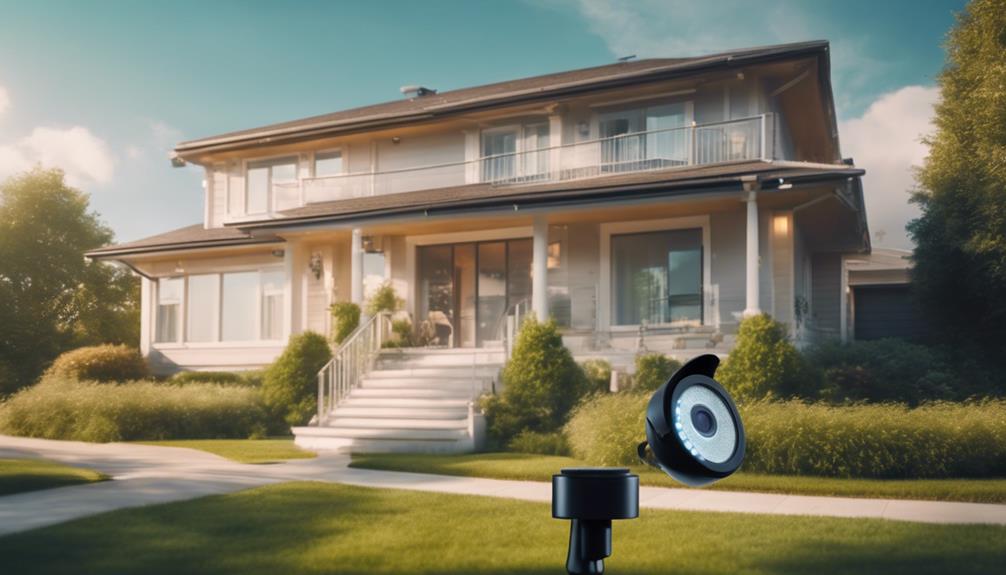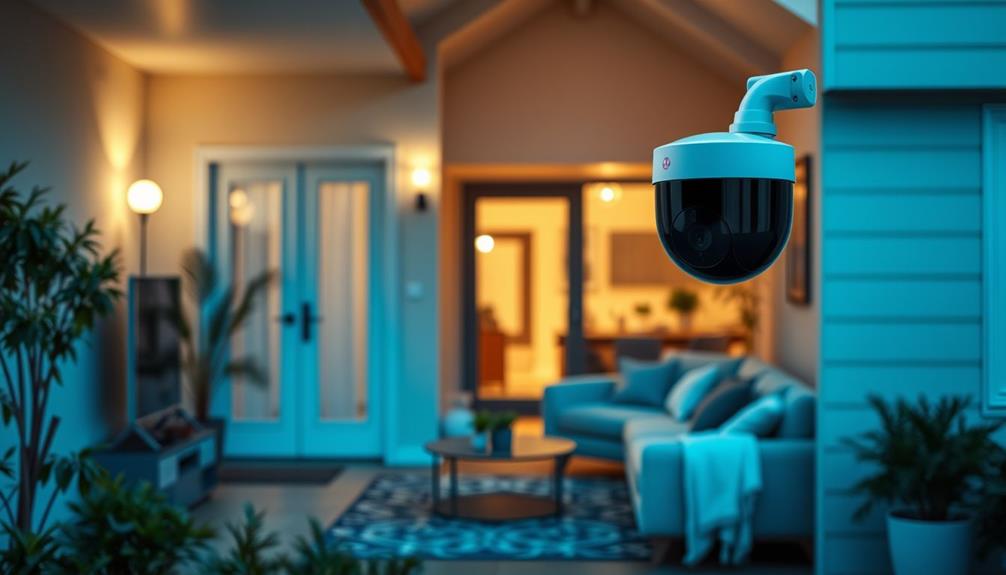Home security systems use a mix of technologies to safeguard your home against intruders and emergencies. These systems typically feature cameras, alarms, and sensors that allow you to keep an eye on your property and receive immediate alerts. You have the option of selecting a DIY installation for adaptability or opting for professional setup for comprehensive monitoring. Many systems also come equipped with smart functions such as remote access and AI-powered notifications to ensure your safety around the clock. Investing in the right system will provide you with peace of mind, knowing that your home is well protected. Interested in finding the perfect fit for your needs? There is a lot more to discover about the various options and advantages available.
Key Takeaways
- Home security systems protect properties from intrusions and emergencies through integrated cameras, alarms, and sensors.
- They can be DIY or professionally installed, offering flexibility and varying levels of monitoring.
- Systems utilize wired or wireless connections, each with distinct advantages and maintenance needs.
- Smart features like AI motion detection and remote monitoring enhance security and user convenience.
Definition and Importance
Home security systems are vital tools that combine cameras, alarms, and sensors to protect your home from intrusions and emergencies. These systems consist of electronic components like burglar alarms, which deter potential intruders and notably reduce crime rates in your area.
With the rise of technology, many modern security systems now feature smart capabilities that allow you to access your home remotely. This means you can monitor your property in real-time, ensuring that you stay informed about any unusual activity. Additionally, some systems can integrate with garage door openers to further enhance home security measures.
Additionally, these systems aren't just about preventing break-ins; they also enhance your overall safety by incorporating smoke detectors and carbon monoxide detectors. These features address various hazards that could threaten your home and loved ones.
When you invest in a home security system, you're not just getting protection from burglars; you're also gaining peace of mind. Knowing that your home is equipped to handle emergencies provides a sense of security that's essential for family well-being.
In short, the importance of home security systems lies in their ability to safeguard your property and enhance your quality of life.
Types of Security Systems

When choosing a home security system, you'll want to evaluate whether you prefer DIY installation or professional help.
Many systems now also prioritize air quality, which is essential for maintaining a healthy home environment, as poor air quality can lead to various health issues, including respiratory problems.
You also need to decide between wired and wireless options, each offering unique benefits.
DIY Vs. Professional Installation
Choosing between DIY and professional installation for your security system hinges on your preferences for cost, convenience, and control. DIY home security systems like SimpliSafe and Ring are designed for easy setup and often come with budget-friendly options. You can choose your own monitoring plans without long-term contracts, giving you flexibility. However, professional installation provides a different experience and may offer additional benefits such as key factors in choosing a home cleaning service, which can also apply to selecting a security provider.
Here are some key points to reflect on:
- Convenience: Professional installation often includes setup by experts, ensuring your system is properly configured and integrated with advanced equipment.
- Monitoring Options: While DIY systems may offer self-monitoring or affordable professional monitoring, professionally installed systems usually come with extensive 24/7 surveillance and emergency response services.
Ultimately, if you're tech-savvy and prefer hands-on control, a DIY system might be right for you. But if you value convenience and support, professional installation could be the better choice.
Wired Vs. Wireless Options
Wired and wireless security systems each offer distinct advantages and drawbacks, so it's essential to ponder your specific needs and preferences.
Wired security systems are hardwired into your home's electrical system, providing a stable connection and reliability during power outages. Additionally, these systems are often favored for their robustness, as noted in current security trends and issues. However, their installation often requires professionals, limiting your flexibility in placement.
On the other hand, wireless security systems rely on battery-operated devices that connect via Wi-Fi or cellular networks, which allows for easier installation and greater flexibility throughout your home. These systems often come equipped with smart features, enabling remote monitoring and control through mobile applications, enhancing your convenience and providing real-time alerts.
While wired systems can be more cost-effective in the long run—thanks to their durability and lack of ongoing battery replacement costs—they typically have a higher initial installation expense compared to wireless options. Wireless systems do require regular battery maintenance, which can be a drawback for some users.
Ultimately, your choice should reflect your budget, desired features, and lifestyle needs.
Smart System Features
Smart security systems offer a variety of features that enhance your home protection and convenience, from live video feeds to automated alerts. By investing in a smart home security system, you can monitor your property in real-time and respond promptly to any incidents.
These systems are designed to work seamlessly with your existing smart device integration, giving you more control than ever before. In today's digital landscape, understanding cybersecurity measures is essential for protecting your home, as many systems can be vulnerable to hacking threats like those seen in recent cybersecurity disruptions.
Here are some key features to evaluate:
- AI-enhanced motion detection: This technology reduces false alarms by accurately identifying movement, ensuring you only get notifications when it matters.
- Facial recognition: Advanced systems can identify familiar faces, offering an added layer of security and peace of mind.
Wireless security systems simplify installation and maintenance, allowing you to connect via Wi-Fi or cellular networks. You'll receive real-time notifications and can remotely control your security features from your smartphone.
With these cutting-edge capabilities, you can feel confident knowing your home is well-protected.
How Security Systems Work

Home security systems work by using various sensors to detect motion, entry, or glass breakage, keeping you informed of any potential threats.
Just like aromatherapy techniques can enhance your well-being, security systems can enhance your peace of mind.
You can monitor your property remotely through mobile apps, ensuring you stay connected no matter where you are.
With features like livestreaming and real-time alerts, you can take control of your home's safety effortlessly.
Sensor Detection Mechanisms
How do sensor detection mechanisms enhance the effectiveness of security systems in protecting your property? These systems are designed to keep you informed and secure by utilizing various types of sensors, each with a specific purpose.
The integration of advanced technology in these systems, akin to AI advancements in cybersecurity, allows for a more responsive approach to threats.
- Motion Sensors: Detect movement within a defined area, triggering alerts if any unusual activity is observed.
- Entry Sensors: Installed on doors and windows, these sensors alert you to unauthorized access, ensuring you're notified immediately.
Connected to a central hub or base station, these sensors work together to deliver real-time notifications directly to your mobile device. This integration allows you to monitor your home remotely, making it easier to respond to any alerts.
Remote Monitoring Features
Remote monitoring features empower you to stay connected to your property, allowing for real-time oversight and control from anywhere. With remote monitoring, you receive mobile notifications whenever your system detects motion, entry, or glass breakage. This guarantees you have real-time awareness of your home's security status, even while you're away. Incorporating these features into your security strategy can enhance your overall user experience, making it easier to manage your home safety effectively.
Many systems come equipped with advanced smart home features, including livestreaming capabilities. This means you can monitor your home in real time, instantly checking for potential security breaches. Flexible management options let you arm or disarm your system using keypads, voice commands, key fobs, or mobile apps, giving you full control at your fingertips.
In addition to self-monitoring, you can opt for professional monitoring services. Alerts sent to a monitoring center enable trained professionals to verify situations and, if necessary, contact emergency services, enhancing your safety.
This combination of remote monitoring and professional support creates a robust security network, guaranteeing that your home is protected around the clock. With these features, you can enjoy peace of mind, knowing that you're always in control of your home's security.
Professional Monitoring Services

Choosing professional monitoring services guarantees you have a dedicated team ready to respond to emergencies 24/7, giving you peace of mind. With these services, you're not just investing in security solutions; you're assuring immediate assistance when it matters most.
When alerts from home security systems are triggered, they're sent to a monitoring center that verifies the situation before contacting local emergency services. Additionally, just as with financial investments, it's essential to assess potential risks to guarantee you're making informed decisions regarding your home security.
Here are some key benefits of professional monitoring services:
- 24/7 Surveillance: Rest easy knowing a team is always watching over your property.
- Enhanced Emergency Response: Monitoring centers provide critical information to emergency responders, improving response times.
While monthly fees for these services typically range from $19.99 to $45.99, the added security and peace of mind often outweigh the cost. By choosing professional monitoring, you're making a proactive choice for your safety and the safety of your loved ones.
Advantages and Disadvantages

Home security systems offer a mix of significant advantages and some drawbacks that every homeowner should evaluate before making a decision. One major advantage is the reduction in burglary risks; studies show that about 60% of burglars avoid homes with visible security systems, enhancing neighborhood safety.
With professional monitoring, you can receive emergency alerts and swift police contact, increasing your safety during critical situations. Additionally, remote monitoring allows you to keep an eye on your property from anywhere via mobile apps, providing peace of mind when you're away.
However, there are disadvantages to weigh. The initial costs for home security systems can average around $400, and if you opt for professional monitoring, monthly fees typically range from $20 to $45. These ongoing expenses can add up over time.
While DIY systems might save you money upfront, they often lack the thorough support and reliability of professionally monitored systems. Finally, although you may enjoy insurance benefits, like discounts on premiums, the initial and ongoing costs may still weigh heavily on your budget.
Balancing these advantages and disadvantages will help you make the right choice for your home security needs.
Key Considerations

Before investing in a security system, it's crucial to evaluate your specific protection needs, such as safeguarding your property, pets, or vulnerable individuals. Understanding what you want to protect will help you choose the right system.
Here are some key aspects to ponder:
- Installation Preferences: Decide if you prefer a DIY installation, which can be budget-friendly, or if you'd rather go for professional monitoring that guarantees thorough setup.
- Monitoring Options: Reflect on whether you'd like self-monitoring through mobile apps or a professional monitoring service that offers 24/7 surveillance and emergency response.
Selecting the right home security camera system or smart security kit tailored to your needs can provide peace of mind.
Pricing and Costs

Understanding the pricing and costs of home security systems is essential for making an informed decision that fits your budget and safety needs. When considering options, you'll find starter home security systems typically range from $150 to $300, while more extensive setups can cost around $400 for installation.
Here's a breakdown of common costs:
| Cost Type | Estimated Price |
|---|---|
| Equipment Costs | $150 – $600+ |
| Monthly Professional Monitoring Fees | $19.99 – $30 |
| SimpliSafe Starter Kits | Starting at $280 |
| Long-Term Costs (Annual) | $600+ |
Keep in mind that ongoing monitoring fees and potential equipment upgrades can greatly affect your long-term costs. Some providers, like SimpliSafe, offer affordable plans, making professional monitoring accessible. Additionally, don't forget about potential homeowners insurance discounts you might receive for having a security system, which can help offset some costs. If you prefer a more hands-on approach, a DIY home security system could be a budget-friendly option that allows you to customize your setup.
Frequently Asked Questions
What Does a Home Security System Include?
A home security system includes entry sensors for doors and windows, motion detectors, surveillance cameras, and alarms. You can also find control panels, smoke detectors, and smart features for remote monitoring to enhance your safety.
What Are the Pros and Cons of a Home Security System?
Isn't your peace of mind worth it? You'll gain enhanced safety and potential insurance discounts with a security system, but consider installation costs and monthly fees, which might strain your budget over time.
Is It Worth It to Get a Home Security System?
It's definitely worth getting a home security system. You'll gain peace of mind knowing your property's protected, plus potential savings on insurance and reduced risk of costly burglaries make it a smart investment.
What Is Required for a Home Security System?
To set up a home security system, you'll need a control panel, various sensors, and an alarm. You can choose between DIY installation or hiring professionals, depending on your comfort level and needs.
What Are the Most Effective Types of Home Security Systems?
When looking to explore home security systems, consider options like security cameras, smart locks, and alarm systems. These types of systems provide different layers of protection for your home, giving you peace of mind and a sense of security. It’s important to research and compare different options to find the most effective solution for your needs.
Conclusion
In a world where you can't even trust your Wi-Fi to stay connected, investing in a home security system might just be your best bet against that overly curious delivery person.
Sure, they'll charge you for peace of mind, but isn't it worth it to keep your prized collection of cat figurines safe?
Just remember, while you're securing your home, the real threat might be your neighbor's incessant lawn gnome obsession.
Priorities, right?









